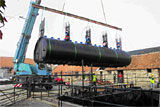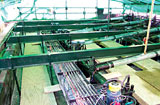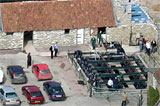Demonstration Plant, Research and Development

Crane installing a set of Maltin
® System tanks in the lagoon at Organic Power's headquarters
Some 15 years ago we began an in-depth and ongoing worldwide study of all the existing organic waste treatment and renewable energy systems based on anaerobic digestion to determine why the process had not been taken up on the greater scale it warranted.
We were aware that anaerobic digestion has long been established as the standard method for dealing with sewage sludge in the water industry. However using the process to treat other forms of organic waste had met with a number of significant problems.
These problems arose mostly from waste handling before and after digestion and from the 'traditional' cylindrical tank designs.

Digestate and gas sampling arrangements
This worldwide study resulted in Organic Power successfully developing the Maltin® System which overcomes these difficulties and protective patents are now in place
Our fully instrumented Demonstration Plant, which has been running since 2002, is also used as a research plant producing valuable data, online, real time. Monitoring takes place in all eight tanks to show the different bacterial activity in the separate tanks, the varying amounts of biogas and the differering ratio of CO2 and CH4 in each of the tanks. Analysis is carried out both in our own laboratory and externally for independent verification.

Organic Power Demonstration Plant in 2002, with our adjacent laboratory
At present there are five areas which are being developed concurrently:
- The installation and monitoring of more advanced forms of the necessary feedstock preparation equipment associated with Maltin® System technology at our headquarters
- The installation of a fully instrumented 6m deep test tank at our UK headquarters which will be used to independently verify the minimal energy input requirements of our system
- A transportable plant for testing different feedstocks which can be taken to sites to demonstrate the technology on the actual materials which require treatment by potential licensees
- The plant at our headquarters will continue to run different fedstocks to demonstrate our technology and to enable the long term independent monitoring of the Maltin® System
We have been carrying out our programme of research in conjunction with Southampton University and the company employs two full time graduate students from Southampton as part of our Team.
Since 2003 Organic Power has been part of the European consortium of 11 partners in 6 European countries which has been investigating how anaerobic digestion can best be applied to provide a versatile, low-cost, carbon-neutral fuel in an environmentally sound and sustainable agricultural framework. The results of all this work can be seen on the Cropgen website, but because of Organic Power's fundamental interest in clean transport fuels, we have included one of the papers Biohydrogen Production directly on Organic Power's website.
Mixing a relatively small amount of biohydrogen with biomethane produces what we call biohythane and gives what we believe is by far the most environmentally friendly transport fuel in the world. Although biomethane is so much more environmentally friendly than any other biofuel, by adding the biohydrogen the flame pattern in an internal combustion engine cylinder head is even more improved. The NOx emissions from pure biomethane are considerably less than the emissions from diesel fuels and are even more reduced when running on biohythane, particularly under varying engine load conditions.